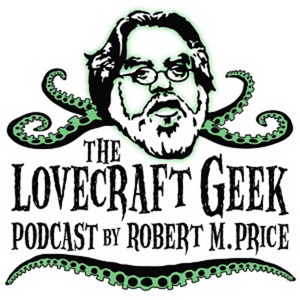The Lovecraft Geek
thebiblegeek

Último episodio
45 episodios
- Might the success of “The Colour out of Space” both as one of my favorite stories and as one of the most popular could be due to its relative independence from the other stories, which it barely references, unburdened by the whole mythos?
Do you feel that the horror genre is too formulaic? Or does this help the audience play along and enjoy it more?
Please tell us about the first time you read the Dream Quest stories and what your initial thoughts were.
Would you mind discussing your Necronomicon chapter of your Holy Fable volume IV, what led to your drafting it, and your thoughts on it in general?
When did Lovecraft's influence upon English authors begin?
Did Lovecraft know French and German, or any foreign languages? Latin , perhaps ?
To what extent do you think the death of his father, grandfather, and mother informed his ideas about cosmic indifference and a universe that does not respect human ideas of natural order?
In “The Shadow over Innsmouth” why is the Esoteric Order of Dagon dedicated to "Dagon", and not some other fish-man god? Or to one of Lovecraft's unpronounceable invented alien names?
After the hero escaped Innsmouth and told the authorities, why did they believe his story? Why not just dismiss him as a nut? After the fish people contacted him later, inviting him to join them, promising immortality and no punishment for all the trouble he'd caused why did he believe them?
The most famous quote from the Necronomicon is, of course, "that is not dead which can eternal lie, and with strange eons even death may die." Do you have an idea of what a more literal translation of the Necronomicon might have said? - The Case of Charles Dexter Ward is also one of my favorite tales, but I am confused about its ending. While exploring Curwen’s underground laboratory, Dr. Willet inadvertently calls up a being that was in jar 118. Who or what was that? Also, he makes a discovery in Charles’ room, and then calls for wood for a fire. My guess is that he found Charles’ body, and then cremated it to obtain its ‘essential saltes.’ He then raised it to find out how to defeat Curwen. Is this correct? Also, Willet mentions to Curwen that his European partners in crime, Orne and Hutchinson, were destroyed or dealt with somehow. Did he call something up to do this?
In Robert E. Howard’s writings and worlds how much of the Mythos creeps in? Are there elder gods and unknown horrors at the edges of the worlds of Conan, Red Sonja, Solomon Kane, Bran Mak Morn, etc? Do any of these sword and sorcery types ever run up against them?
How well do you think REH's horror compares? Did he get cosmic horror?
Isn’t it sort of silly that Wilbur Whately, a nine-foot-tall prodigy who stalks about in public with a pistol at the ready, is done in by a dog? - In Weird Realism: Lovecraft and Philosophy, Graham Harman argues that Lovecraft's description of the Elder Things is intended to be nearly impossible to visualize. But hasn’t it been done by various artists?
Do you know if H.P. ever said something explicit about Poe's influence on him?
Perhaps a "Nodens Cycle" book is impossible due to the lack of material, but I wondered if you could help me flesh out his development as a Mythos entity and as a product of Lovecraft's thought-process. Of all ocean gods in human mythology, why would Lovecraft emphasize Nodens in two stories? Was Lovecraft merely honoring Machen by using that name? And why do you suppose Nodens is connected with the Night-gaunts?
Two arguments for using Antarctica as the setting for a film version of At the Mountains of Madness.
I was wondering if you could discuss John Carpenter's 1982 film "The Thing"? What are your overall thoughts on it, and can you comment on the Lovecraftian elements of the plot, setting, ending etc. Also, what are your thoughts on the prequel film (if you've seen it), also titled "The Thing" (2011).
If HPL lived today, after the discovery of extra-solar habitable planets, would he have changed his belief that there are no alien races out there?
Why did HPL, once a fan of Burroughs, turn away from him?
Have you ever had a chance to read through HPL's letters? If so did you ever find anything in them that surprised you or altered your basic assumptions and views of the man?
Acerca de The Lovecraft Geek
Robert M. Price hosts the definitive exploratory podcast of H. P. Lovecraft and the all-encompassing, eldritch Mythos universe.
Sitio web del podcast